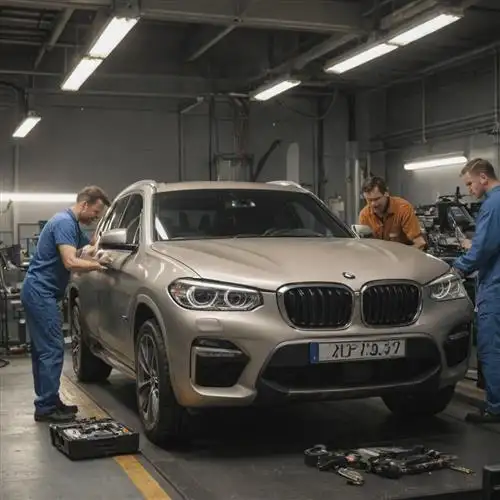
Preventive Maintenance Strategies for Your BMW X3
Maintaining the pristine condition of your BMW X3 is crucial to ensure its longevity and performance. As a luxury SUV, the X3 requires specialized care and attention to keep it running at its best. In this comprehensive guide, we'll explore the essential preventive maintenance strategies that every X3 owner should implement.
Firstly, adhering to the manufacturer's recommended service schedule is paramount. BMW's meticulously designed maintenance plan takes into account the specific needs of the X3, encompassing everything from oil changes and filter replacements to brake inspections and tire rotations. Diligently following this schedule not only preserves the vehicle's warranty but also helps prevent costly repairs down the line.
Another critical aspect of preventive maintenance is meticulously inspecting the braking system. The BMW X3 is equipped with high-performance brakes that require regular attention. Regularly checking the brake pads, rotors, and calipers, and addressing any issues promptly, can ensure optimal braking performance and longevity.
Tires are the foundation of your X3's handling and stability, and proper tire maintenance is crucial. Regularly rotating your tires, checking their pressure, and replacing them when necessary can significantly improve fuel efficiency, ride quality, and overall safety. Additionally, considering the use of high-quality, BMW-recommended tires can enhance the vehicle's handling and responsiveness.
The X3's engine and drivetrain are the heart of the vehicle, and their proper maintenance is essential. Adhering to the recommended oil change intervals, using the correct oil grade, and addressing any potential issues with the engine or transmission can help prevent costly repairs and ensure optimal performance.
Lastly, paying attention to the X3's electrical system is crucial. Regular inspections of the battery, alternator, and other electrical components can help identify and address any issues before they become more significant problems. Additionally, keeping the X3's software up-to-date, either through BMW-authorized service centers or reputable third-party providers, can help ensure the vehicle's systems are functioning at their best.
Identifying and Addressing Common BMW X3 Maintenance Issues
As a BMW X3 owner, it's crucial to stay on top of maintenance to ensure your vehicle runs smoothly and maintains its value. One of the most common issues BMW X3 owners face is the need for frequent brake pad replacements. The X3's powerful brakes can wear down pads quickly, especially if you do a lot of city driving or towing. Be proactive and inspect your brake pads every 6 months or 5,000 miles to catch any issues early. Replacing pads before they wear down to the metal can save you from costly rotor replacements down the line.
Another common problem is oil leaks. The X3 engine uses a lot of gaskets and seals that can dry out and crack over time. Regularly inspecting for leaks around the oil filter housing, valve cover, and oil pan is crucial. Catching small leaks early can prevent bigger, more expensive issues like sludge buildup or engine failure.
Owners also report problems with the X3's variable valve timing system. The system can become sluggish or fail entirely, leading to rough idling, reduced power, and decreased fuel efficiency. If you notice any performance issues, have the system checked by a BMW specialist. Timely replacement of the variable valve timing solenoids is key to preventing more serious damage.
One often overlooked maintenance item is the X3's differential fluid. The rear differential fluid should be changed every 30,000 miles to ensure proper lubrication and cooling. Neglecting this can lead to premature differential failure, which is an extremely expensive repair.
Finally, be vigilant about the X3's cooling system. These vehicles are prone to coolant leaks, water pump failures, and radiator issues. Regularly flushing the coolant and inspecting the system for any signs of wear can help you avoid an overheating disaster down the road.
Optimizing BMW X3 Performance through Proper Maintenance
Maintaining your BMW X3 is crucial to ensuring its peak performance and longevity. Beyond the routine oil changes and tire rotations, there are several critical areas to focus on to extract the maximum potential from your luxury SUV.
Engine and Fuel System Maintenance: Regular engine tune-ups, including replacing spark plugs and inspecting the fuel injection system, can significantly improve your BMW X3's horsepower and fuel efficiency. Neglecting these components can lead to decreased power, reduced gas mileage, and even long-term engine damage.
Brake System Upkeep: The brakes on your BMW X3 are an integral part of its safety and performance. Regularly inspecting the brake pads, rotors, and calipers, and replacing them as needed, can ensure your brakes remain in peak condition. Neglecting the brakes can compromise your vehicle's stopping power and handling.
Suspension and Steering Maintenance: The suspension and steering components in your BMW X3 play a crucial role in its ride quality and responsiveness. Regularly inspecting the shocks, struts, ball joints, and tie rods, and replacing worn parts, can enhance the SUV's handling, cornering, and overall driving dynamics.
Cooling System Upkeep: The BMW X3's cooling system is responsible for keeping the engine at optimal operating temperatures. Flushing the coolant, inspecting the hoses and belts, and ensuring the radiator is functioning correctly can prevent overheating and engine damage.
Tire Maintenance and Alignment: Properly inflated tires with adequate tread depth can improve your BMW X3's fuel efficiency, handling, and overall safety. Additionally, regularly aligning the wheels can enhance the SUV's straight-line stability and reduce tire wear.
Electrical System Inspection: The BMW X3's complex electrical system powers a wide range of features, from the infotainment system to the advanced safety technologies. Regularly inspecting the battery, alternator, and wiring can prevent electrical failures and ensure your SUV's electronics function as intended.
Essential Maintenance Routines for Long-Term BMW X3 Ownership
Maintaining your BMW X3 is crucial for ensuring its longevity, performance, and safety. As an essential part of long-term ownership, adhering to a comprehensive maintenance routine is key. From regular oil changes to meticulous inspection of critical components, the care you provide your X3 will directly impact its dependability and resale value.
One of the most fundamental maintenance tasks is the oil change. BMW recommends changing the oil and filter every 10,000 miles or 12 months, whichever comes first. Utilizing the proper synthetic oil as specified by the manufacturer is crucial, as it helps maintain the engine's efficiency and reduces wear and tear. Neglecting this routine service can lead to costly repairs down the line.
Alongside oil changes, it's vital to stay on top of other fluid maintenance, such as regularly inspecting and replacing the brake fluid, transmission fluid, and coolant as needed. Brake fluid, for instance, can become contaminated over time, compromising the braking system's performance and reliability. Proactively addressing these fluid levels and conditions will safeguard the overall health of your BMW X3.
The BMW X3's suspension system is another area that requires meticulous attention. Regularly inspecting the shocks, struts, and bushings for signs of wear or damage can help identify potential issues before they escalate. Timely replacement of these components can provide a smooth, comfortable ride and enhance the vehicle's handling characteristics.
Tire maintenance is also a critical aspect of long-term BMW X3 ownership. Ensuring proper tire inflation, rotation, and alignment not only maximizes fuel efficiency but also promotes even tread wear and improved handling. Additionally, regularly inspecting the tires for signs of wear or damage can help you avoid unexpected blowouts or premature replacements.
Regular maintenance of the braking system is essential for the safety and performance of your BMW X3. This includes inspecting the brake pads, rotors, calipers, and brake lines for any signs of wear or deterioration. Prompt replacement of worn components can help maintain the vehicle's stopping power and provide you with peace of mind on the road.
Lastly, paying attention to the overall condition of your BMW X3, from the exterior to the interior, can help preserve its value and appearance. Routine cleaning, waxing, and protective treatments can safeguard the paint, while regular cleaning and conditioning of the leather upholstery can keep the cabin looking and feeling like new.
Navigating BMW X3 Maintenance Costs and Budgeting Strategies
Maintaining your BMW X3 can be a delicate balance between ensuring your vehicle's longevity and managing your financial resources. As a luxury SUV, the X3 demands a higher level of attention and care, but with the right strategies, you can keep your maintenance costs in check. In this guide, we'll explore the key factors to consider when budgeting for your BMW X3's upkeep, helping you make informed decisions and maximize the value of your investment.
Understanding the BMW X3's Maintenance Needs: The BMW X3 is engineered with precision, but it also requires specialized attention. From regular oil changes and tire rotations to more complex repairs, the maintenance schedule for this vehicle can be extensive. By familiarizing yourself with the recommended service intervals and common issues, you can better anticipate and plan for the associated costs.
Factoring in Genuine BMW Parts and Authorized Service: One of the hallmarks of BMW ownership is the emphasis on genuine parts and authorized service. While these options may carry a higher price tag, they ensure that your X3 is maintained to the manufacturer's standards, preserving its performance and longevity. Weigh the benefits of using genuine parts against the potential savings of aftermarket alternatives, but remember that the long-term value of your vehicle may depend on your commitment to proper maintenance.
Budgeting for Routine Maintenance and Unexpected Repairs: Developing a comprehensive maintenance budget is crucial for BMW X3 owners. This should include regular service items, such as oil changes, brake pad replacements, and fluid flushes, as well as a contingency fund for unexpected repairs. By anticipating these costs and setting aside dedicated funds, you can avoid financial surprises and ensure your X3 remains in top condition.
Leveraging Extended Warranties and Service Plans: Many BMW dealers and third-party providers offer extended warranty coverage and service plans for the X3. These can help offset the costs of major repairs and provide peace of mind. Carefully review the terms and conditions of these plans to determine if they align with your ownership goals and budget.
Exploring Cost-Saving Maintenance Strategies: While the BMW X3 requires a certain level of professional care, there are ways to reduce maintenance costs without compromising the vehicle's performance. Consider performing some basic maintenance tasks yourself, such as air filter replacements or wiper blade changes. Additionally, stay vigilant in monitoring your X3's condition and addressing issues promptly to prevent minor problems from escalating into more expensive repairs.
















